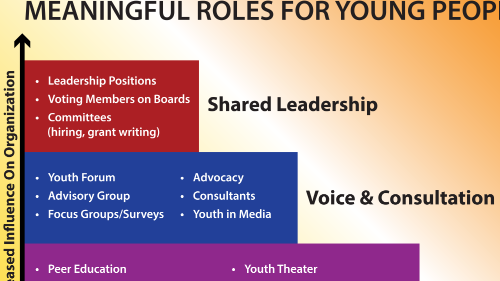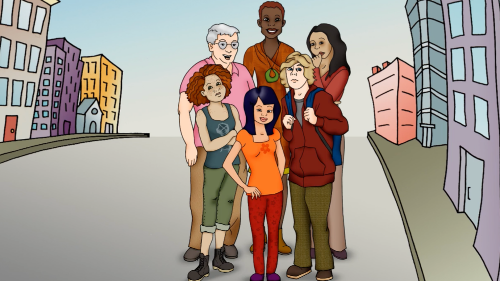Principles of Positive Youth Development
What is Positive Youth Development?
Positive Youth Development (PYD) is a research-based approach or philosophy that guides communities in the way they organize supports and opportunities [pyd/sos.cfm] so that young people can realize their potential. PYD is not about a single program and it's not about getting youth to change. It's a way of setting the stage for young people to thrive — and it often requires adults to change.
At its fullest expression, positive youth development is undertaken by communities in collaboration with young people to create supportive and challenging environments, relationships, and experiences that promote meaningful change. More often, it is an approach led by youth-serving organizations and programs to improve their effectiveness and co-create better outcomes with and for youth.

The U.S. Interagency Working Group on Youth Programs offers this definition:
"Positive Youth Development is an intentional, prosocial approach that engages youth within their families, peer groups, schools, organizations, and communities in a manner that is productive and constructive; recognizes, utilizes, and enhances youth's strengths and assets; and promotes positive outcomes for young people by providing opportunities, fostering positive relationships, and furnishing the support needed to build on their leadership strengths." [1]
PYD Principles
In brief, PYD is a commitment to the following principles:
- Aim for positive outcomes: We shift from primarily preventing or fixing problems to co-creating positive outcomes such as competencies, connections, and contribution.
- Use a strength-based approach: We help young people identify their internal and external strengths and we create opportunities for them to build on their strengths. We nurture developmental relationships and environments in and beyond our programs and organizations.
- Promote youth engagement and voice: We work with young people, not for them. We prepare ourselves and other adults for authentic youth engagement and shared decision-making. We listen to young people's expertise and perspectives, engage them in meaningful roles of their choosing, and create effective youth-adult partnerships. We foster mutual accountability.
- Utilize inclusive strategies: We provide support and opportunities to all young people, not just to those labeled "at-risk" and/or "gifted." While it may be necessary to provide additional support to some youth to ensure that basic needs of safety, food, shelter, and belonging are met, strategies that are designed to reach all young people are often very effective for youth who have been marginalized or underserved.
-
Foster collaborative, long-term community engagement: We work together across community sectors to promote a pro-youth, strength-based culture shift, and to provide:
- services to meet basic needs
- sustained, supportive, developmental relationships
- safe, structured environments that foster a sense of belonging
- meaningful opportunities to learn, grow, and contribute
- long-term support and opportunities that adjust to changing developmental needs throughout adolescence

A Note on Terminology
Youth development terminology is not fixed. "Youth development" may refer to a set of principles, a natural process that adolescents go through, or a range of practices used in programming. For a discussion of the meanings of the term, see "Principles for Youth Development" by Hamilton, Hamilton, and Pittman (reprinted with permission). For a foundational analysis of the positive youth development approach, see "Preventing Problems, Promoting Development, Encouraging Engagement" by Pittman and colleagues.




